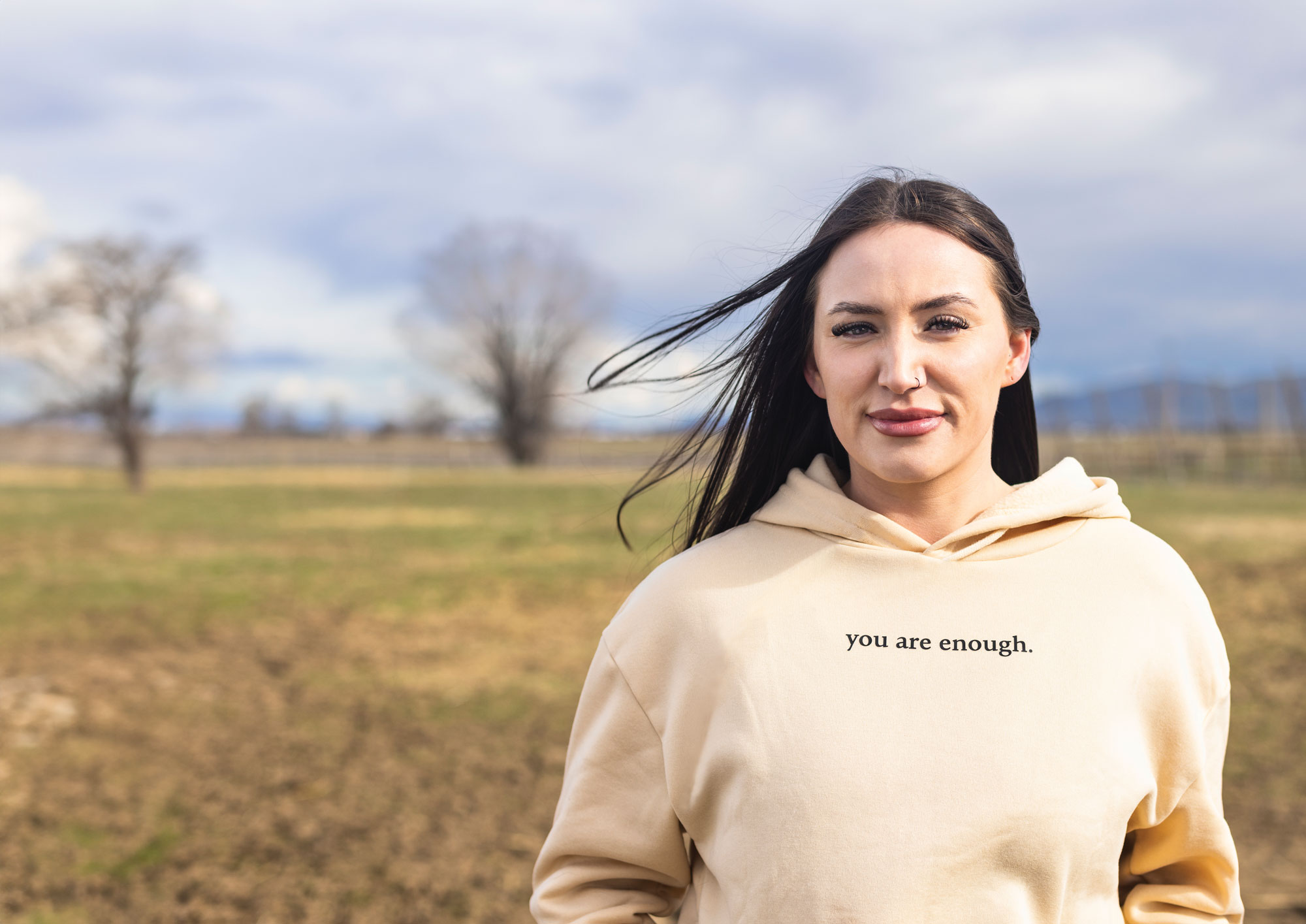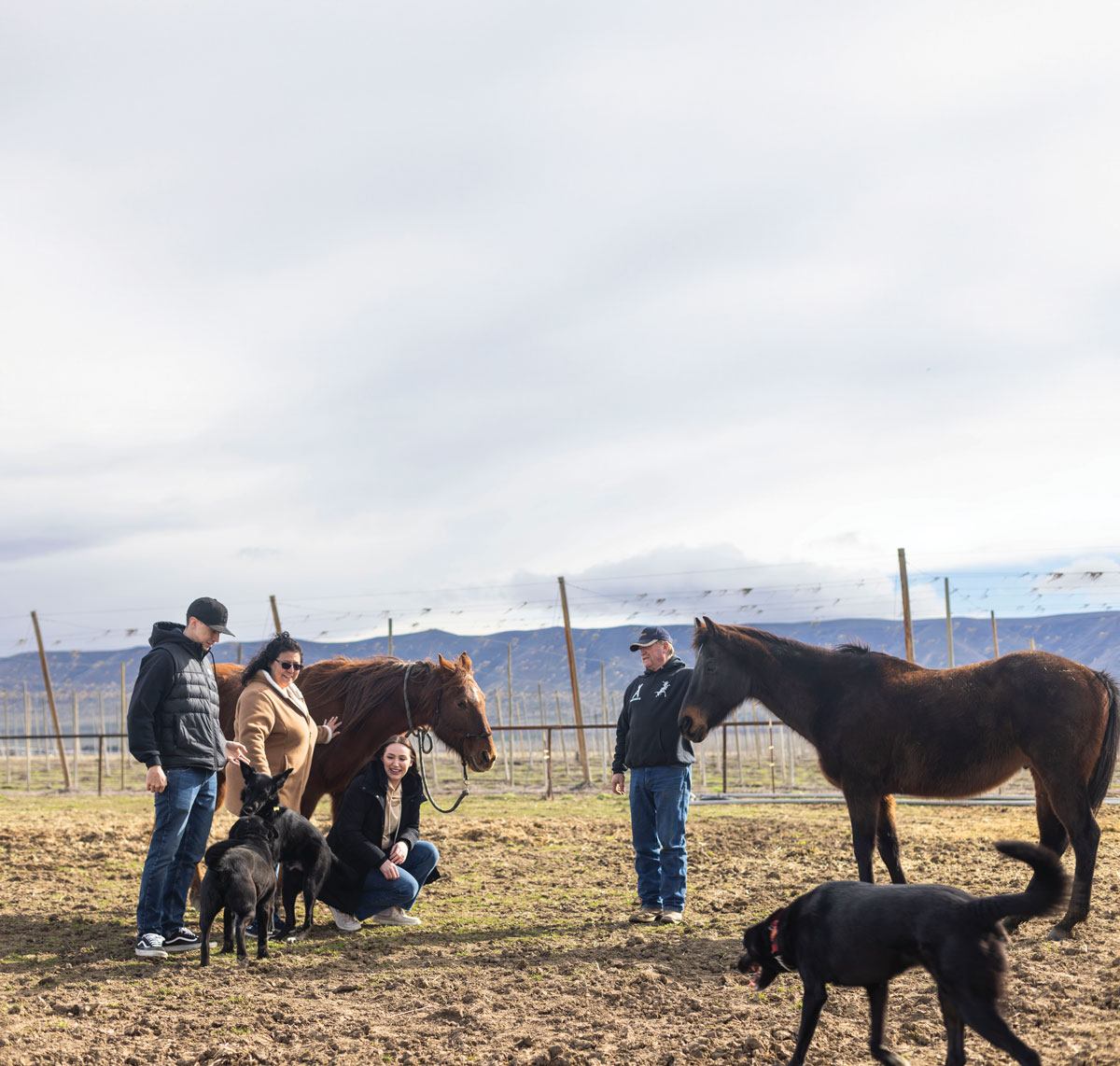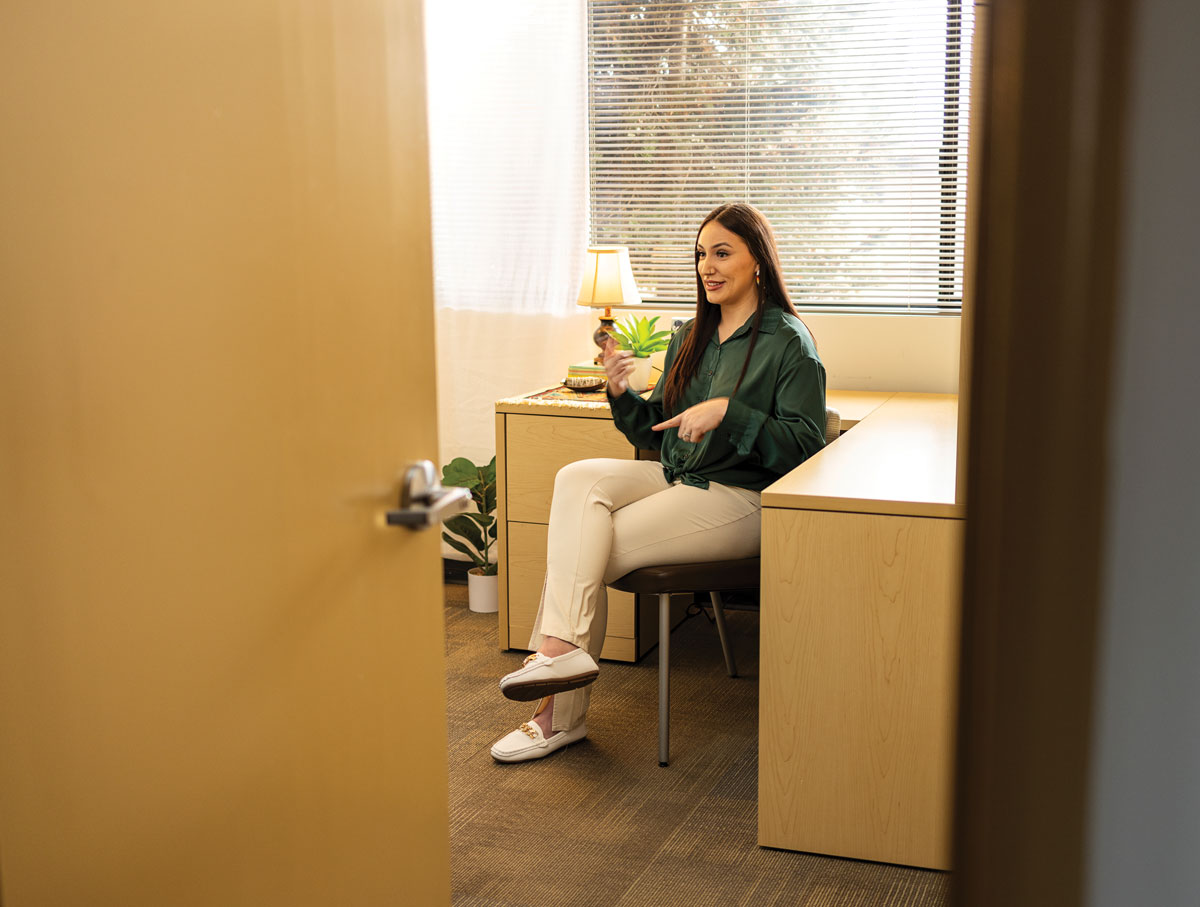Coming home Coming home Coming home
Nocona Abrams returned to the Yakima Valley to improve mental health care for her community.

Nocona Abrams returned to the Yakima Valley to improve mental health care for her community.
Many of her childhood memories are dear to Nocona Abrams: The gleaming snowcap of Pahto (Mt. Adams), the sacred mountain of the Yakama Nation, dominating the skyline to the west of her family’s country home. The familiar aspects of life in her rural tribal community of White Swan, like knowing everybody’s name (“and everybody’s business,” she says with a touch of deadpan humor) or sitting in class and watching a horse amble by in the field across the street. The way the community showed up loud and proud for her basketball games, packing the high school gym to cheer on the White Swan Cougars.
But it wasn’t perfect. Abrams remembers her parents’ constant safety concerns for her and her two brothers—crime was high in the area. Many in the Yakama Nation community lived with intergenerational trauma, says Abrams, ’19, ’23. “We still have elders who were forced into boarding schools as children. Often they’re raising their grandchildren and great-grandchildren, and unwittingly passing that trauma on.” And then there were her own mental health struggles: depression, anxiety, trauma and sometimes suicidal thoughts.
Abrams sought therapy at a nearby behavioral health clinic. But, she remembers, it seemed like each time she was finally ready to open up, her counselor would quit, and she’d have to start from scratch with a new one. She was experiencing firsthand the high turnover of community mental health care. After a few tries, she gave up on therapy for a while—but she didn’t give up on herself.
She set her sights on a future somewhere else. She excelled in school, took on leadership roles and played sports. And when she was accepted to the University of Washington, she had no intention of ever moving back.
Nearly a decade later, much has changed. Abrams is back—with two UW degrees in hand, thanks to the support of generous donors and the faculty and staff who trained and encouraged her. She’s a mental health therapist helping people in her community, many of them facing struggles that are familiar to her from her own life.
It took moving away from home to help Abrams remember what she loved about it—and how she wanted to help make it better.
“Every time she returned, she was reminded of what she missed: her community and her people.”
“It was a culture shock,” says Abrams of her arrival at the UW. “People in Seattle dress differently than back home. They speak differently. They joke differently.” Even so, Abrams soon came to love it, settling in as a psychology major and philosophy minor, both areas of study that taught her about herself. She flourished, making friends, earning scholarships that provided financial support and validation, and building a life in Seattle.
Slowly but surely, though, she began to feel the pull of home. Every time she returned for a visit, she was reminded of what she missed: “my community and my people.”

Nocona (third from left) and her husband (left) enjoy spending time with her parents—and their assortment of animals—at their home in White Swan on the Yakama Indian Reservation.
At the end of her senior year, her adviser at the Office of Minority Affairs & Diversity recommended a monthlong volunteer trip to Bali, where Abrams would work as a mental health adviser. On that trip, she visited a center for people with schizophrenia, an inpatient psychiatric ward, a school for children with autism and an orphanage for Deaf children. “I learned so much about the different ways people experience the world—and I affirmed how much I loved helping others,” she says. “My psychology degree was opening outward.”
She stayed with a Balinese host family in a rural village, and she got to take part in community celebrations and cultural practices around life events like births, weddings and deaths. “It felt similar to my own experience of how Native peoples gather for these same events, with their own practices that are different from Western ones,” she says.
When Abrams returned home to her community and a new job, at Yakama Nation Behavioral Health Services in Toppenish, she immediately began drawing from her experience and studies. In her first year on the job, she worked on grants to help prevent suicide and substance use, and to promote mental health for American Indian and Alaska Native youth.
A year later, she began the UW master’s program in social work. But this time she didn’t want to leave home—and she didn’t have to. The School of Social Work’s three-year extended degree program allowed her to work and study at the same time. Ordinarily, she would have traveled to the UW a few times a quarter for weekend classes, but during the start of the pandemic, her studies were fully remote. She quickly put her new learnings to work: “I was getting skills and insights I could immediately use in my job serving Indigenous peoples.”
In her day job, Abrams managed grants and policies that impacted Native youth. She deepened her community involvement through additional work, internships and volunteering: leading grief recovery groups, providing therapy for unhoused youth, serving as a crisis counselor, launching a health clinic at a tribal school and much more.
“The support I received didn't help only me. It helped, and continues to help, my entire community.”
Nocona Abrams
On top of her graduate work, she was a research assistant at the UW Indigenous Wellness Research Institute, where she helped study the impact of COVID-19 on Indigenous peoples—work that was used to develop policy recommendations for Congress. “Indigenous peoples are not well represented in evidence-based research, and it means a lot to me that the UW has an institute like this,” says Abrams.
She went on to collaborate with Angelique Day, an associate professor in the School of Social Work, to culturally adapt an evidence-based life-skills curriculum for Yakama Nation youth. It would result in Abrams’ first published paper. But more important to her, it was a tangible example of how her research could help youth in her community.

Abrams is now a therapist at Yakima Valley Farm Workers Clinic.
As Abrams thrived academically and expanded her impact through her work, she received public funding and philanthropic support for her graduate studies. But with one year left, that funding ran out. “I thought I might have to leave school,” she remembers.
Then her field adviser told her about the Washington State Behavioral Health Workforce Development Initiative, or WDI. Supported by the Ballmer Group at 12 universities and 20 graduate programs statewide, the WDI offers scholarships for graduate students in social work or mental health counseling. Recipients commit to serving in community-based behavioral or tribal health centers after they graduate.
Abrams was already doing this work and she wanted to continue, so she applied for and received a WDI grant for her final year—and graduated on time, in June 2023. An unexpected benefit to the WDI grant: resources like a guest speaker series and workshops on preventing burnout. As an alumna, Abrams still has access to them.
“Resources like these are hard to come by when you’re in the community behavioral health field or with a small agency that doesn’t have a lot of funding to train staff,” she says. “Having free resources is really nice.”
Abrams recently embarked on a new role as a mental health therapist at the Yakima Valley Farm Workers Clinic in Yakima, counseling individuals and leading therapy groups. It’s a new challenge with new opportunities to grow, she says, “and it aligns with my values of helping people who are historically underserved.”
As she reflects on the public and philanthropic support that helped her get where she is today, Abrams thinks of her community first: “When students who want to serve their communities have to delay or call off their studies, they’re not the only ones hurt. Patients are hurt. Their families are hurt. The whole community hurts. The support I received didn’t help only me. It helped, and continues to help, my entire community. To that I say, ‘Kwathlanushamaash—thank you.’”